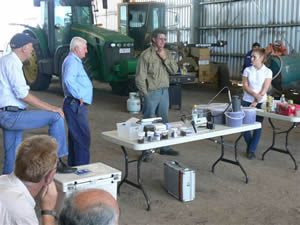The innovative work of farming is still done in the shed. At a recent meeting in the Burdekin, farmers worked with different field and laboratory methods for measuring soil microbial activity. Their aim was simple, to get data to evaluate their management practices with respect to the health of their soil and the productivity of sugarcane and vegetable crops.
Farmers used the standard Solvita® soil CO2 respiration test to compare sugarcane soils that had received mill mud and ‘biology’ with soils that were farmed conventionally. Microbial activity was enhanced.
Farmers that used this approach commented that phosporus availability had increased 3-fold (as indicated by Colwell-P test) and the new recommendation was not to apply P fertiliser. The challenge now is to reassess crop responses to inputs in new systems of farming where the maintenance and enhancement of soil health is emphasised to achieve both crop yield and the wider benefits of soil-based ecosystems.
The meeting was organised by Tom McShane (standing on left) of the Burdekin Bowen Integrated Floodplain Management Committee to discuss the broader issues of Carbon in Farming. Ken Bellamy of vrm Biologik spoke about applying microbes to the soil and Dr. Steve Ockerby, a freelance scientist, addressed the issue of soil carbon in sugarcane farming systems.

